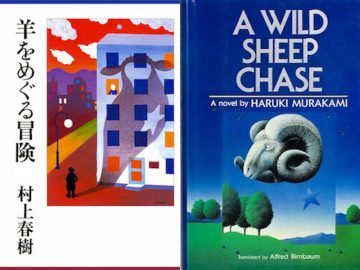David Karashima in The Paris Review:
 On May 10, 1989, Haruki Murakami’s editor at Kodansha International, Elmer Luke, sent Murakami a fax reporting on the sale of U.S. paperback rights to A Wild Sheep Chase (to Plume for fifty-five thousand dollars) and asking him to take part in the promotional activities that were scheduled in New York that fall. Murakami declined. Several months later, Luke and Murakami met in person for the first time in Tokyo (together with another editor from KI), and on August 14, just three days before a copy of A Wild Sheep Chase arrived at the Murakamis’ home, Luke again asked Murakami to join him in New York. Murakami once again declined. On September 24, Luke asked again, saying that Murakami’s translator Alfred Birnbaum had become unable to attend, and that they had also managed to arrange an interview with the New York Times. Murakami finally relented.
On May 10, 1989, Haruki Murakami’s editor at Kodansha International, Elmer Luke, sent Murakami a fax reporting on the sale of U.S. paperback rights to A Wild Sheep Chase (to Plume for fifty-five thousand dollars) and asking him to take part in the promotional activities that were scheduled in New York that fall. Murakami declined. Several months later, Luke and Murakami met in person for the first time in Tokyo (together with another editor from KI), and on August 14, just three days before a copy of A Wild Sheep Chase arrived at the Murakamis’ home, Luke again asked Murakami to join him in New York. Murakami once again declined. On September 24, Luke asked again, saying that Murakami’s translator Alfred Birnbaum had become unable to attend, and that they had also managed to arrange an interview with the New York Times. Murakami finally relented.
Murakami and his wife, Yoko, landed in New York on October 21, and Luke and Tetsu Shirai, the head of Kodansha’s New York offices, picked them up at the airport. Shirai remembers handing Murakami a copy of that day’s New York Times folded open to a story in the arts section about him and A Wild Sheep Chase. The headline, “Young and Slangy Mix of the U.S. and Japan,” was followed by a tagline: “A best-selling novelist makes his American debut with a quest story.” “Of course, it was something that had been in the works,” Shirai tells me, “but I was surprised by how well the timing worked out.”
Shirai and Luke had chosen a hotel on the Upper East Side, thinking Murakami, an avid runner, would like to be near Central Park. Ten years later, Murakami would write in an essay for the women’s magazine an an that, while he preferred the Village and SoHo with its many bookshops and secondhand record stores, he ends up staying uptown in New York because “the appeal of running in Central Park in the morning is too great.”
More here.
